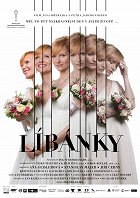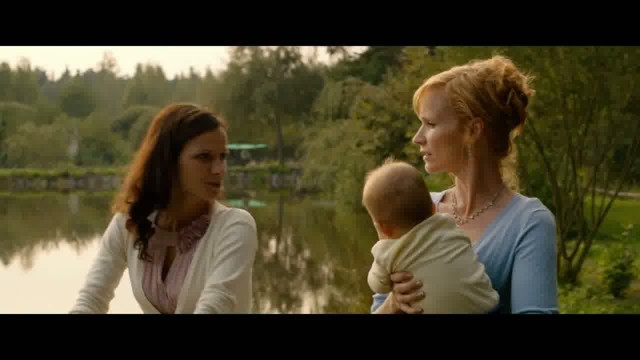Rendező:
Jan HřebejkForgatókönyvíró:
Petr JarchovskýOperatőr:
Martin ŠtrbaZeneszerző:
Aleš BřezinaSzereplők:
Aňa Geislerová, Stanislav Majer, Jiří Černý, Kristýna Badinková Nováková, David Máj, Jiří Šesták, Jana Radojčičová, Matěj Zikán, Vlastimil Dušek (több)Tartalmak(1)
Tom jóképű, sportos fiatalember, aki éjszakai rádióműsorokban dolgozik. Sarah, a csinos, szabad szellemű fiatal írónő gazdag család csemetéje, aki mellé természetesen nem egy Tomhoz hasonló senkit képzeltek el sznob szülei. A két fiatal azonban rögtön az első találkozás után egymásba szeretett. Tom barátainak meghökkenése és Sarah családjának szívós ellenkezése dacára a két fiatal összeházasodik. Az esküvő után Itáliába indulnak nászútra, ám semmi sem úgy történik, ahogy remélték. A nászút szerelmük és friss házasságuk szakítópróbájává válik... (HBO Europe)
(több)Recenziók (8)
Feszült dráma a bűntudatról, a felelősségről és a múlt árnyairól, amelyek egy napon utolérnek. Pszichológiailag pontosan felépített, csak egy-két tétova szerkesztési hibával (értsd: WTF-pillanatokkal). Folyamatosan bizonytalanságban tartja az embert, hogy vajon hol az igazság, mennyire színezett, és ki a nagy rossz vagy a szenvedő. Folyamatosan szimpatikusan könnyítve a nővér férjének alakjával, aki részegségében inkább a vécét választja az ágy helyett az alváshoz.
()
And here it goes again! Once again I came across a Czech movie that really knocked my socks off with how good it was, but when I came to Filmbooster what knocked my socks off were the other users here. The worst part is that from reading the czech reviews here, I didn’t find a single reason why Honeymoon should have gotten such a negative score. Where are all the bad reviews? In my opinion, Honeymoon is a pretty brutal psychological movie, which reminded me mostly of Scandinavian dramas. I admit that it could have been a lot more brutal, but on the other hand, everything is made up for by the excellent acting performances, where the actors make sure that you know what to think about their character. Other than Geislerová’s character, which seemed a bit unfinished to me after I saw the movie. But everything is made up for by the visual ending, which proves that the director of photography is the man. Honeymoon might be a chamber drama, but it has no problems mesmerizing you with its human roughness, which is something I don’t see in Czech movies very often to be honest.
()
This film is like Dogma with incredibly stupid descriptive monologues and one-liners like "we hid inside of each other". The only uncertainty in the film is when one of the characters goes from book recitations to wooden talk. Psychology? Ridiculous. Trier's final heist beyond the edge of everything. A fake game of an aestheticized tragedy, under which there is a black hole of persistent efforts to get inside the pathology of human relationships. It's not just that Jarchovsky's scenarios are excessive, unnatural and disintegrating (although they can theoretically reconstruct logical thematic units, contexts and intentions to shake the viewer), it's that Hřebejk chooses a senselessly pompous style instead of civility, which exacerbates the debility as a result. His films do not lack ambition and potentially a world look, but they do desperately lack the ability to get into characters in ways other than through visual and verbal explicitness. Sorry, but this fake offends me deeply. [30%]
()
The dialogue was at times so silly you couldn't possibly say it, the acting unconvincing for the camera – it would have worked in the theatre and there would have been ovations, but it didn't fit a film. A good nibble here and there and you get the feeling that’s how it would happen and it all feels natural, but then it's broken up by bad acting or moronic dialogue. Here and there a nice image, but this film is not artistic... where is Czech cinema headed? :-D
()
The film looks as if its creators were trying to make a B movie thriller from the 1990s, which does not go hand in hand with Hřebejk's poetics of humorous supporting characters. This special comedic-dramatic mix survives thanks to the camera and great actors. However, a strong story, a meaningful plot construction and, above all, focus, are all missing. This is rather a disappointment due to the missed opportunity.
()
When I was about 8-14 years old, I suffered from the fact that whenever something on TV appealed to me and I thought it was cool or importantly adult, without usually understanding what the movie was about, I would store various sections of the movie and its atmosphere in my mind and try to replicate them in my own work. That's how I remember when I was writing a story about a ritual killer on the streets of old Prague whose motivations date back to Nazi times (we had Se7en on tape, which I had ultimately ripped off, as did The Crimson Rivers) or a short story about how a mysterious figure returns to a remote village at the beginning of the last century and disfigured bodies start appearing in the fields (I had seen the trailer for Sekal Has to Die and the grim faces of the villagers in the middle of the suspiciously golden fields made it clear that the plot just needed a few disfigured corpses, plus I thought the title was cool). I consider the masterpiece to be an action story created after I'd seen Die Hard 3, which culminated in a scene where, during a fiery speech by the Prime Minister, a barrel of special chemical fluid flies through the window on either side of his lectern, and when they combine together they explode horribly. (...go ahead and laugh; what Netflix would give for that these days). Yeah and then you have the forty-three year old Jarchovský – a renowned, Czech Lion-winning screenwriter who has just seen a Nordic Drama (tm) and started waving his little hands and yelping while the credits are still rolling, and his wife knows immediately – she sticks a pen in one hand, paper in the other, and his big toe in his mouth so he can concentrate, and by midnight his work is finished. By morning Hřebejk has figured out that it has to be in a luxurious farmhouse under the cold orange lights of sunsets, sunrises, and decorative bulbs, so the peeling facade of idyll and better society can be seen. He automatically calls the last 6 numbers dialed to put together the cast and from that point on, God’s will be done. _______ There's something sadistically charming in knowing exactly what the actors are trying with comical urgency to achieve, how the director wants to be formally relevant, but still can't squeeze it out of the declamatory script, and ultimately you end up with some crazy scenes where a seemingly drunken pregnant Geisler screams at her newlywed husband in scripted fashion and a mega-important ten-minute close-up of the theater (not really film) actor Černý's face testifying that their kisses have always been salty from tears. I still have some sympathy for H+J here, because at least it's trying to be a bit naturalistic and unsettling for the Czech viewer, but surely there can be no worse combination than trying really hard at something intensely weighty only to end up dragging it into the ridiculous.
()
I can't help but think this film is extremely well constructed, where you have an almost uncomfortable sense of something terrible that could happen. This may not come to fruition in the way you expect, but the film is still quite gritty in its second half. This is where Hřebejk's mastery of gradually revealing what is important comes into play.
()
I have reservations about the final quarter of an hour, which is brought down by the weak script. Nevertheless, such a good psychological drama, captivatingly filmed by cinematographer Martin Štrba, would probably be hard to find in Czech cinema over the last ten years. A lot of credit for this goes not only to the quality direction of Jan Hřebejk but also to the convincing performances of the central trio. (75%)
()

